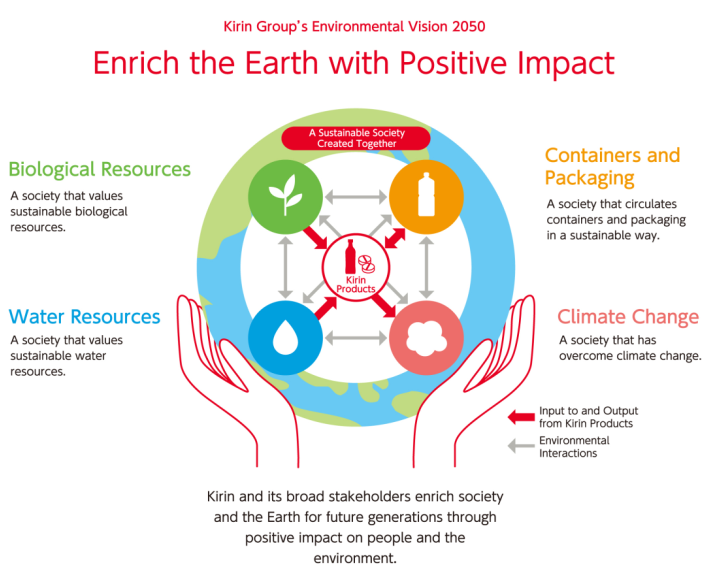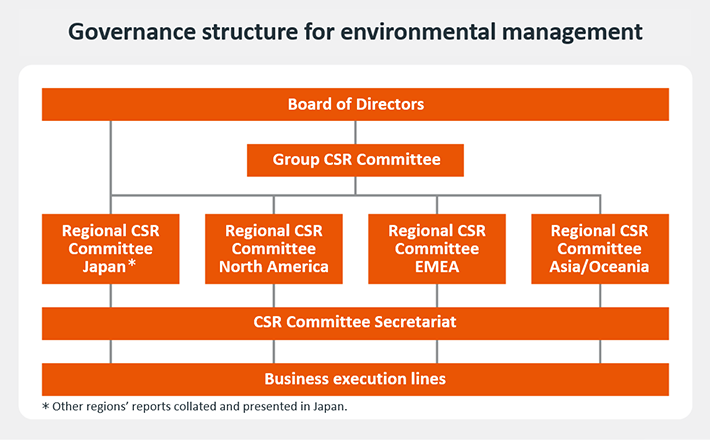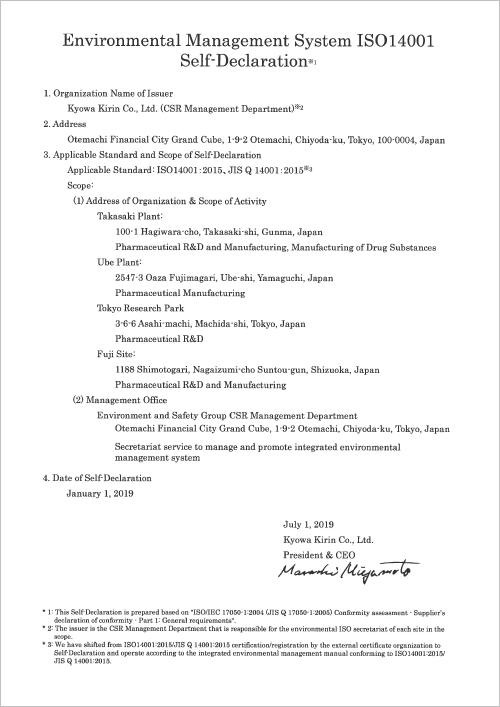Environmental Management
Policy and Strategy
Kyowa Kirin Group is engaged in business activities pursuant to its clear-cut commitment to the environment, aiming to achieve its targets in accordance with the Kyowa Kirin Group Environmental Policy. We are also seeking to decarbonize our company and its value chain so that we can actively protect the global environment for the sake of the next generation.
Kyowa Kirin Group's various environmental policies are consistent with Kirin Holdings' policies. The "Kirin Group Environmental Vision 2050" presents a vision of the ideal society that is our Group’s aim, and we will be working with Kirin Holdings to realize this vision.
Kirin Group Environmental Vision 2050
In 2020, the Kirin Group to which our Group belongs revamped its existing long-term environmental vision and formulated the Kirin Group Environmental Vision 2050 as a new long-term strategy for strengthening social and corporate resilience.
The Kirin Group's aim goes beyond minimizing and neutralizing negative impacts, and entails having a positive impact on society that transcends the bounds of our own company. Under this new vision, we will work together with a broad array of stakeholders, beginning with our customers, to enrich society and the Earth for future generations by generating positive impacts on nature and people.

Environmental Policy
Our Group's environmental management activities are based on the Kyowa Kirin Group Environmental Policy. We have also established internal rules and standards that stipulate specific procedures for environmental management, and these complement the policy.
Kyowa Kirin Group Environmental Policy
Revised on February 1, 2022
The Kyowa Kirin Group pursues advancements in life sciences and technologies, gives consideration to the environmental impacts of its products throughout their entire life cycle extending from research and development through production, marketing, use and disposal, as well as across the supply chain, and makes dedicated efforts to protect the global environment for the next generation, with the aim of contributing to the health of people around the world and the achievement of a flourishing society.
- 1.We recognize the impact of our business activities on the environment, and promote environmental activities by setting targets for issues of materiality.
- 2.To enhance environmental performance, we have established an environmental management system and are continuing to make improvements.
- 3.Not only do we comply with environmental laws, regulations, agreements, etc., but we also set additionally stringent voluntary management standards to promote prevention of environmental contamination.
- 4.We strive to save resources and energy, and reduce greenhouse gas emissions to prevent global warming.
- 5.We strive to reduce water consumption and waste disposal and promote recycling to contribute to achieving a recyclable society.
- 6.We implement ongoing activities to protect the local environment and ecosystems to preserve biodiversity.
- 7.We conduct environmental education and awareness activities to enhance environmental awareness.
In addition, Kyowa Kirin Group identifies issues (materialities) that our Group should prioritize due to their impacts on social sustainability and our Group's business. One of these environmental materialities is reducing our impact on the global environment, which has been incorporated into our Medium-term Management Plan 2021-2025. Kyowa Kirin is setting targets for each fiscal year and implementing measures accordingly. Climate change mitigation/adaptation and water resource management, which fall under the rubric of reducing environmental impact, have been positioned as core environmental issues, medium- to long-term targets as well as single-year targets set, and various measures implemented. For more information, please see the "Materiality and SDGs," "Climate change" and "Water resources management" pages.
Governance
Our Representative Director and Executive Vice President serves as the chief executive in overall charge of the Group’s environmental management inclusive of climate change issues, while the CSR Management Department is in charge of administering environmental measures for the entire Group.
The CSR Committee, chaired by the Representative Director and Executive Vice President, reports, deliberates, and makes decisions on important issues related to the Group's environmental management, including the status of global and regional activities and issues related to climate change risks and opportunities, at the quarterly Group CSR Committee meetings or Regional CSR Committee meetings held four times a year. The CSR Committee’s reports, deliberations and decisions are reported to the Board of Directors.

Environmental Monitoring
Our Group complies with environment-related laws and regulations and carries out environmental activities by setting stricter in-house control values. In addition, our plants and research laboratories operate ISO14001-compliant environmental management systems.
In May 2018, we have completed the update to the new standard ISO14001:2015 on all ISO14001 certified sites. As of January 1, 2019, we have from third-party certification to self-declaration of conformity.
Sites making ISO14001 self-declarations of conformity:
Takasaki Plant, Ube Plant, Tokyo Research Park, Fuji Site

Risk Management
Responses to Environmental Accidents
Potential environmental risks are incorporated into our Group's risk management system in accordance with our Group Rule for Risk Management, and are periodically determined, classified, and reviewed as well as continually managed using risk ledgers, etc., based on indicators such as the frequency of occurrence and the degree of impact. In the unlikely event of a serious incident, reports are submitted promptly to the Representative Director and Executive Vice President and the Board of Directors through the relevant organization responsible for crisis management and responses are quickly determined in accordance with the Group Crisis Management Regulations.
There were no legal violations or environmental accidents resulting in environmentally-related penalties anywhere in Kyowa Kirin Group in fiscal 2023.
Environmental and Safety Audits
Kyowa Kirin Group conducts yearly environmental and safety audits to confirm that its environmental and safety management system is functioning and operating properly. We conducted the environmental and safety audits on 4 companies encompassing 10 locations in fiscal 2023. The audits of our plants and research laboratories are conducted at a higher level by having not only the auditors from the head office but also the environmental and safety officers from other plants and research laboratories in the same company participate as auditors.
By investigating the root causes of the issues identified in audits and making systemic improvements, we are helping to prevent accidents, disasters and compliance violations.
Environmental Training
Employees engaged in environmental management are obliged to take regular specialized training on the environment. We also provide regular environmental training to general employees on an annual basis, using e-learning and other means to promote understanding of our environmental activities. In 2024, we have implemented a common training program for the entire Kyowa Kirin Group (worldwide).
Dealings with Suppliers
Kyowa Kirin Group has set forth the Kyowa Kirin Group Procurement Policy, established a Supplier Code of Conduct for suppliers to follow. These guidelines call on suppliers to take the initiative in addressing environmental issues, recognizing that such issues are common to humanity and essential to the company's operations and survival. We conduct an annual "Sustainable Procurement Questionnaire" for suppliers to analyze the current status of activities in the supply chain and identify issues that need to be addressed to achieve sustainable procurement. We also provide opportunities for suppliers to deepen their understanding of our sustainable procurement activities by holding supplier briefings to share information on issues and solutions across the supply chain. In 2023, 530 people from 395 domestic suppliers participated in the supplier briefings.
Response to TCFD Recommendations
In November 2021, we expressed our support for the recommendations of the Task Force on Climate-Related Financial Disclosures (TCFD) and we have been disclosing information on the impact of climate change on our business. Please see the "Information disclosure based on TCFD recommendations" page for details on our response to the TCFD recommendations.
In December 2018, Kirin Holdings Company, Limited, announced its support for the TCFD recommendations on behalf of Kirin Group to which our company belongs, and it has since been conducting climate change scenario analyses as well as resilience assessments of our management strategy, and have been announcing its results.
Independent Assurance
We have received third-party assurance*1 for Scope 1 and Scope 2 emissions, energy consumption and water intake for the entire Kyowa Kirin Group in fiscal 2023 with the aim of ensuring the reliability and transparency of information.
The Kirin Group, to which the Kyowa Kirin Group belongs, has also obtained third-party assurance for Scope 1 and Scope 2 emissions and water intake for the entire Kirin Group, including our Group, for fiscal 2023.
- *1:Independent third-party assurance has been received from KPMG AZSA Sustainability Co., Ltd. in accordance with the International Standard on Assurance Engagement (ISAE) 3000 and the ISAE 3410.